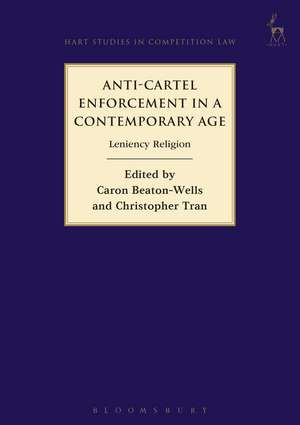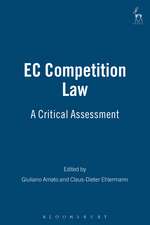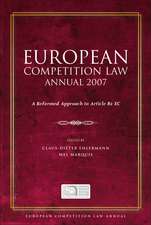Anti-Cartel Enforcement in a Contemporary Age: Leniency Religion: Hart Studies in Competition Law
Editat de Caron Beaton-Wells, Christopher Tranen Limba Engleză Hardback – 23 sep 2015
Din seria Hart Studies in Competition Law
- 30%
 Preț: 956.51 lei
Preț: 956.51 lei - 21%
 Preț: 275.26 lei
Preț: 275.26 lei - 18%
 Preț: 313.74 lei
Preț: 313.74 lei - 18%
 Preț: 313.07 lei
Preț: 313.07 lei -
 Preț: 315.54 lei
Preț: 315.54 lei - 22%
 Preț: 270.75 lei
Preț: 270.75 lei - 30%
 Preț: 540.54 lei
Preț: 540.54 lei - 27%
 Preț: 777.24 lei
Preț: 777.24 lei - 14%
 Preț: 893.15 lei
Preț: 893.15 lei - 30%
 Preț: 539.18 lei
Preț: 539.18 lei - 21%
 Preț: 217.35 lei
Preț: 217.35 lei -
 Preț: 365.91 lei
Preț: 365.91 lei - 22%
 Preț: 238.22 lei
Preț: 238.22 lei - 18%
 Preț: 313.46 lei
Preț: 313.46 lei - 22%
 Preț: 261.17 lei
Preț: 261.17 lei - 23%
 Preț: 255.76 lei
Preț: 255.76 lei - 18%
 Preț: 299.96 lei
Preț: 299.96 lei - 21%
 Preț: 235.29 lei
Preț: 235.29 lei - 22%
 Preț: 250.09 lei
Preț: 250.09 lei - 18%
 Preț: 322.05 lei
Preț: 322.05 lei - 30%
 Preț: 894.38 lei
Preț: 894.38 lei - 22%
 Preț: 780.23 lei
Preț: 780.23 lei - 30%
 Preț: 539.57 lei
Preț: 539.57 lei - 24%
 Preț: 189.80 lei
Preț: 189.80 lei - 30%
 Preț: 837.39 lei
Preț: 837.39 lei -
 Preț: 319.13 lei
Preț: 319.13 lei - 22%
 Preț: 251.65 lei
Preț: 251.65 lei - 30%
 Preț: 569.22 lei
Preț: 569.22 lei - 30%
 Preț: 961.39 lei
Preț: 961.39 lei - 27%
 Preț: 1136.75 lei
Preț: 1136.75 lei
Preț: 779.09 lei
Preț vechi: 1116.05 lei
-30% Nou
Puncte Express: 1169
Preț estimativ în valută:
149.10€ • 155.09$ • 123.09£
149.10€ • 155.09$ • 123.09£
Carte tipărită la comandă
Livrare economică 12-26 aprilie
Preluare comenzi: 021 569.72.76
Specificații
ISBN-13: 9781849466905
ISBN-10: 1849466904
Pagini: 360
Dimensiuni: 169 x 244 x 18 mm
Greutate: 0.82 kg
Editura: Bloomsbury Publishing
Colecția Hart Publishing
Seria Hart Studies in Competition Law
Locul publicării:London, United Kingdom
ISBN-10: 1849466904
Pagini: 360
Dimensiuni: 169 x 244 x 18 mm
Greutate: 0.82 kg
Editura: Bloomsbury Publishing
Colecția Hart Publishing
Seria Hart Studies in Competition Law
Locul publicării:London, United Kingdom
Caracteristici
The analysis in the book draws on the disciplines of law, regulation, economics, criminology and political science.
Notă biografică
Caron Beaton-Wells is a Professor at the Melbourne Law School, University of Melbourne.Christopher Tran is a barrister at the Victorian Bar, Australia.
Cuprins
Part I: Introduction1. Leniency Policies: Revolution or Religion? Caron Beaton-WellsPart II: Leniency Convergence and Divergence2. Leadership of Leniency Ann O'Brien3. Leniency Policy with Chinese Characteristics Mark WilliamsPart III: Leniency and the Competition Authority4. What do we know about the Effectiveness of Leniency Policies? A Survey of the Empirical and Experimental Evidence Catarina Marvão and Giancarlo Spagnolo5. Anti-Cartel Enforcement in Japan: Does Leniency Make the Difference? Steven Van Uytsel6. Leniency, Profiling and Reverse Profiling in Multi-Product Markets: Strategic Challenges for Competition Authorities Leslie M Marx and Claudio Mezzetti7. A Case for Capping the Dosage: Leniency and Competition Authority Governance William E KovacicPart IV: Leniency and the Corporation8. Leniency Decision-Making from a Corporate Perspective: Complex Realities Andreas Stephan and Ali Nikpay9. Leniency: The Poisoned Chalice or the Pot at the End of the Rainbow? Ian S Forrester and Pascal Berghe10. Reconditioning Corporate Leniency: The Possibility of Making Compliance Programmes a Condition of Immunity Brent FissePart V: Leniency and the Individual11. Leniency, Whistle-Blowing and the Individual: Should We Create Another Race to the Competition Agency? Maurice E StuckePart VI: Leniency and Crime12. Leniency and Criminal Sanctions in Anti-Cartel Enforcement: Happily Married or Uneasy Bedfellows? Christopher Harding, Caron Beaton-Wells and Jennifer EdwardsPart VII: Leniency and Compensation13. Why Leniency does not Undermine Compensation Daniel A Crane14. Leniency and the Two Faces of Janus: Where Public and Private Enforcement Merge and Converge Laura GuttusoPart VIII: Leniency and Compliance15. The Air Cargo Cartel: Lessons for Compliance Howard Bergman and D Daniel Sokol16. Combining Leniency Policies and Compliance Programmes to Prevent Cartels Joe Murphy
Recenzii
Anti-Cartel Enforcement in a Contemporary Age constitutes a very valuable volume. It challenges the too easily accepted assumptions concerning leniency and it explores many of the under-analysed questions relating to leniency's place in the broader system of enforcement. It warrants a careful read of policy-makers, competition authorities' officials and practitioners alike.
Profs Beaton-Wells and Tran assembled first-rate authors, and superbly structured the book's chapters, succeeding in making this book a must-read for both practitioners and scholars of the antitrust/competition.
...an interesting, timely, and important book. There is a tremendous variety of economic, legal, philosophical, and practical perspectives on the role of leniency policies in modern cartel enforcement in the U.S., the EU, and in other jurisdictions.
...the 16 chapters [the book] comprises are not only uniformly excellent, but they raise the right questions...It should figure on the reading list of all competition law enforcers and practitioners.
Nothing can detract form the excellent job all the contributors and the editors do in critically discussing the practical issues of leniency programmes...The book is a strongly recommended purchase for all academics and practitioners interested in antitrust enforcement issues.
Kudos to the editors and authors of [this work] for producing such an interesting, timely, and important book. There is a tremendous variety of economic, legal, philosophical, and practical perspectives on the role of leniency policies in modern cartel enforcement...Any practitioner, enforcement official, or academic involved or interested in cartel enforcement and the role of leniency will want to read this book.
Profs Beaton-Wells and Tran assembled first-rate authors, and superbly structured the book's chapters, succeeding in making this book a must-read for both practitioners and scholars of the antitrust/competition.
...an interesting, timely, and important book. There is a tremendous variety of economic, legal, philosophical, and practical perspectives on the role of leniency policies in modern cartel enforcement in the U.S., the EU, and in other jurisdictions.
...the 16 chapters [the book] comprises are not only uniformly excellent, but they raise the right questions...It should figure on the reading list of all competition law enforcers and practitioners.
Nothing can detract form the excellent job all the contributors and the editors do in critically discussing the practical issues of leniency programmes...The book is a strongly recommended purchase for all academics and practitioners interested in antitrust enforcement issues.
Kudos to the editors and authors of [this work] for producing such an interesting, timely, and important book. There is a tremendous variety of economic, legal, philosophical, and practical perspectives on the role of leniency policies in modern cartel enforcement...Any practitioner, enforcement official, or academic involved or interested in cartel enforcement and the role of leniency will want to read this book.















